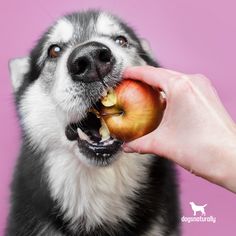Introduction
Dogs are not just our furry companions; They are also members of our family. Dogs, being omnivores, can enjoy a variety of foods including fruits. As such, we often want to share our food with them, including fruits. While it is true that dogs can safely enjoy some fruits, it is essential to know which ones are suitable for them and in what quantities. Here’s what’s safe, what’s not, and how to make sure your furry friend stays healthy and happy.
Dogs Can Eat any Common Fruit Safely
Apple :
Apples are an excellent source of vitamins A and C, as well as Fiber, for both humans and dogs. They are safe for dogs to eat, but be sure to remove the seeds and core, as they contain cyanide, which can be harmful. When feeding apples to dogs, always remove the seeds, pits, and cut the apples into small pieces. Feed your dog apples, apples are considered a delicious and healthy food for dogs.
Watermelon :

Watermelon is a popular summer fruit that is safe for dogs to eat in moderation. Watermelon is low in calories and contains essential nutrients like vitamins A, B6 and C as well as potassium and magnesium. Although watermelon is generally safe for dogs, it is important to remove the seeds before offering it to your pet to avoid any potential digestive issues.
Blueberry :
Blueberries are packed with antioxidants and vitamins, making them a superfood for both humans and dogs. Blueberries are low in calories and high in fiber, making them a great treat for overweight dogs. You can offer blueberries into your dog’s food for an extra nutritional boost.
Pineapple :
Pineapple is a tropical fruit that can provide several health benefits for dogs. Pineapples contain bromelain, an enzyme that can assist in digestion and alleviate inflammation. They are also rich in essential vitamins and minerals such as vitamin C and manganese. While generally safe for dogs, pineapples should be given in moderation as their high fiber content could potentially lead to digestive issues if consumed excessively.
Banana :

Bananas are another fruit that dogs can enjoy in moderation in large amounts. They are rich in potassium, fiber and vitamins B AND C. Just peet the banana and be sure to remove any strings that could be a choking hazard. When feeding bananas, always peet the banana and feed it to your dog in small pieces to avoid choking. So bananas can be a good nutritious delicacy for dogs.
Mango :
Mango is a sweet and nutritions fruit that dogs can enjoy as an occasional treat. Mangoes are rich in vitamins A, C and E, as well as fiber and antioxidants, which can benefit your dog’s overall health. Mangoes contain natural sugars, so they should be given in moderation to prevent weight gain and possible digestive problems.
Strawberries :
Strawberries are another fruit that dogs can enjoy as a tasty treat. Strawberries are rich in antioxidants, fiber and vitamin C, which can support your dog’s immune system and promote healthy digestion. You can offer fresh or frozen strawberries to your dog, but be sure to remove the stems and cut them into small, bite-sized pieces before feeding them to your dog.
Fruit to Avoid Feeding Dogs
Grapes and raisins :
Grapes and raisins are highly toxic to dogs and can cause kidney damage, even in small amounts. It is essential to keep these fruits out of your dog’s reach at all times, as even a single grape can be harmful to dogs.
Lemons :
Citrus fruits such as oranges, lemons and limes contain citric acid, which can cause gastrointestinal upset in dogs. The oils and psoralen found in citrus fruits can be toxic to dogs if consumed in large amounts.
Avocado :
Although avocados are safe for humans, they contain a substance called persin, which is highly toxic to dogs. Large seeds pose a choking hazard adn the high fat content can causepancreatitis in dogs.
Cherry :
Cherries are a delicious fruit, but caution is required when feeding them to dogs due to some risks. Cherries contain pits that pose a choking hazard, and the stems and leaves contain cyanide, which is toxic to dogs if eaten in large quantities. Before giving cherries to your dog, be sure to remove the pits, stems, and leaves, then feed them and offer small amounts as an occasional treat.
What is moderation
Although some fruits are safe for dogs to eat, it is important to remember that moderation is key. Too much of any fruit can cause digestive upset and weight gain in dogs. Always give small amounts of fruit to your dog and observe their reaction from time to time.
Fruit Benefits for Dogs
Feeding your best fruits for dogs in moderation can provide many health benefits. Fruit provides a variety of health benefits for dogs, including essential nutrients, Vitamins and hydration. Fruits are rich in vitamins, menerals and antioxidants, which help boost your dog’s immune system, improve their digestion and promote overall well-being. Hydration Many fruits have a high water content, which can help keep your dog hydrated, especially in hot weather.
Caution When Feeding fruit to dogs
When feeding fruit to your dog, always remove seeds, pits and cores, as these can pose a choking hazard or contain toxins. It is therefore important to feed fruit to dogs, removing the open part of the fruit, discarding the seeds and pits.
How to Introduce Fruit to Your Dog
If you are feeding your dog fruit for the first time, start small and observe their reaction or behavior. Some dogs can be picky eaters or have sensitive stomachs, so introducing new foods gradually is essential.
Fruit Allergy Symptoms in Dogs
Although rare, some dogs may be allergic to certain fruits. Symptoms of fruit allergy in dogs include itching, redness, swelling, vomiting, diarrhea and difficulty breathing. If you suspect that your dog is allergic to a particular fruit, stop feeding it immediately and consult your veterinarian.
Conclusion
Although best fruits for dogs can safelyenjoy some fruits, it is important to know which ones are approriate for them and in what amounts. Apples, bananas, blueberries, strawberries, pineapples and mangoes are excellent choices for dogs these can be safely fed to dogs in moderation and these fruits are nutritious, healthy foods for dogs. Avoid cherries, grapes, raisins, citrus fruits and avicados. Be sure to feed your dog a moderate amount of fruit, remove any seeds or pits, and then serve the fruit to the dog. By following these guidelines, you can ensure that your furry friend is healthy, normal and happy.
FAQs
Can all dogs eat these fruits?
While most dogs can enjoy these fruits in moderation, it’s essential to monitor for any adverse reactions and consule with your veterinarian if your have any concerns.
Are there any fruits that dogs should avoid?
Yes, some fruits are tixic to dogs, such as grapes, raisins, and avocados. It’s essential to research before introducing new foods into your dog’s diet.
Is mango safe for dogs to eat?
Yes, dogs can eat mangoes in moderation. Just be sure to remove the pits and skin, as these can be difficult for the dog to digest.
How much fruit can I give my dog?
The amount of fruit you can give your dog depends on their size, age and individual dietary needs. It’s best to start with small amounts and gradually increase, monitoring for any digestive issues.
How should I introduce fruits to my dog’s diet?
Introduce fruits gradually and in small amounts to assess your dog’s tolerance and prevent any adverse reactions.
Can dogs eat cherries?
No, dogs should not eat cherries. Cherry pits contain cyanide, which is toxic to dogs, and can cause digestive upset.
What should I do if my dog has an adverse reaction to fruit?
If your dog experiences any adverse reactions after eating fruit, such as vomiting, diarrhea, or lethargy, stop feeding them that fruit immediately and consult with your veterinarian for further guidance.

